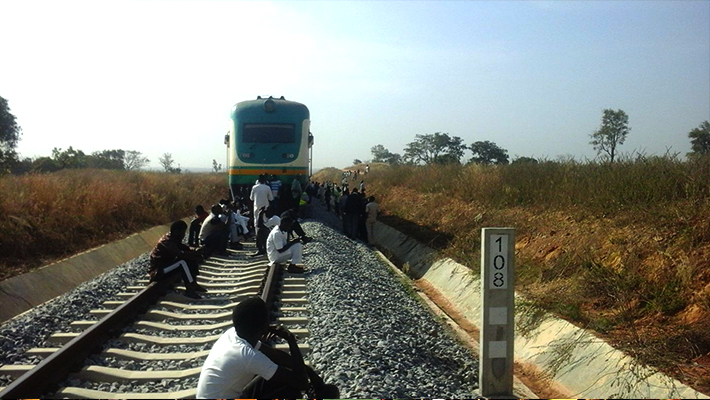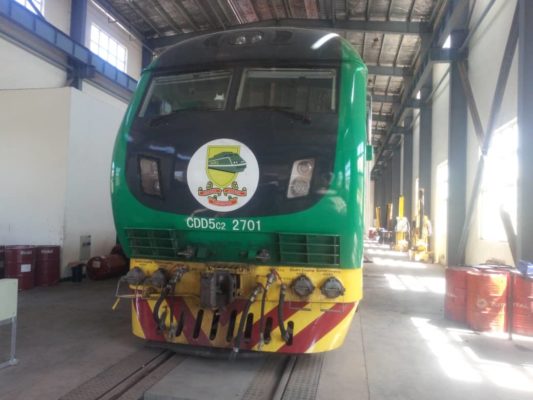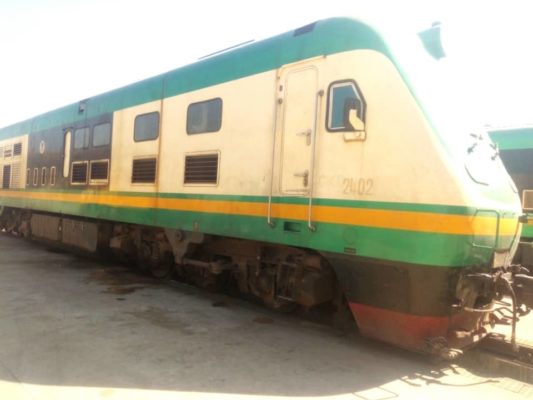Abuja-Kaduna Rail: Chinese supplier blames ‘bad luck’ for frequent locomotive breakdowns

The China Railway Construction Corporation Limited (CRCC) has blamed ill luck for the malfunctioning locomotives it recently built for Nigerians.
CRCC after-sales manager Su Zhiguang, who heads the maintenance team on the Abuja-Kaduna rail line, told Peoples Gazette that the trains, which arrived in Nigeria in January, were test run and certified ready for deployment in China.
At least three passenger trains had broken down after suffering mechanical failures in quick succession over the last two weeks, leaving hundreds stranded along the dangerous Abuja-Kaduna tracks.
A video, which went viral on November 26, showed passengers aboard a Kaduna-Abuja train voicing their displeasure, shortly after the locomotive broke down in dark hours along a route that is widely dreaded for kidnapping and other violent crimes.
When asked why the trains (CDD5c2 2701 and CDD5c2 2702 models) were frequently breaking down only a few months after they were commissioned, the CRCC engineer said: “It’s hard to say, maybe bad luck because the trains were newly built and certified okay by our company in China before they were sent to Nigeria in January.”
“In my many years of experience in after-sales service, this situation is the first I’m seeing,” Mr. Zhiguang said.

“2701 and 2702 locomotives are produced by our company (CRCC). In China and other countries, we don’t have so many problems (mechanical faults). We’ve built trains that are still under our warranty and functioning for several years. There shouldn’t be too many problems with new locomotives,” he added.
When the Gazette visited the main Abuja rail terminal, Idu, within the week, the new CDD5c2 2701 locomotive was inoperative. Officials said the train was undergoing repairs due to a turbocharger failure, a problem they said was not common amongst trains delivered to the previous administration.
“We’ve been using trains acquired under the Jonathan administration for about four years now and they are still fully operational, but we really can’t tell much about the new locomotives acquired by the present administration,” an official at the Abuja rail terminal told the Gazette under anonymity to volunteer internal information without authorisation.

Mr. Zhiguang, however, told the Gazette that CRCC may extend the warranty window for the trains’ maintenance as compensation for the frequent mechanical glitches.
“We may sign a new contract to delay expiration of the warranty to compensate for the issues we are having with the locomotives,” the official said, adding that the company would consult with Chinese international contractor, CCECC, to decide on extending the one-year maintenance warranty.
Rattled by the embarrassment the faulty locomotives have caused the Buhari administration, Nigeria’s transport minister Rotimi Amaechi declared that the malfunctioning trains will be returned to China.
“It is worrisome that these locomotives that are brand new are failing,” Mr. Amaechi said on November 26 while inspecting the Lagos-Ibadan rail project.
“We have called the Chinese to come back for the locomotives that are bad or have failed more than two or three times. We should be worried that brand new locomotives that we bought failed,” he added. “It should be failing after three to five years. There is a warranty and we have to call them back”.
The Debt Management Office (DMO) had published late June that $3.121 billion Chinese loans are project-tied to about 11 rail projects across the country.
The transport ministry, however, has yet to open its books to intimate Nigerians on how much was spent in acquiring the new locomotives.
We have recently deactivated our website's comment provider in favour of other channels of distribution and commentary. We encourage you to join the conversation on our stories via our Facebook, Twitter and other social media pages.
More from Peoples Gazette

Politics
Katsina youths pledge to deliver over 2 million votes to Atiku
“Katsina State is Atiku’s political base because it is his second home.”

States
Safe Motherhood Week: Kwara government distributes birth kits to 16 LGAs
The commissioner noted that the safe birth kits enhance hygienic practices during delivery.

NationWide
Nigerian parents advised against hiding children with disabilities
Bolanle Olawuyi of the Department of Social Sciences Education, University of Ilorin, has appealed to parents of disabled children against hiding them due to shame or stigma.

Health
Anambra ready to take delivery of malaria vaccine: Commissioner
Health commissioner Afam Obidike disclosed this in Awka on Friday at a news conference to mark the 2024 World Malaria Day.

Lagos
Sanwo-Olu sacks 391 ‘redundant’ workers at Lagos Water Corporation
The Lagos Water Corporation has announced the sacking of 391 redundant employees as part of its ongoing restructuring efforts.

States
Calabar-Itu Road: Cross River set to pay N400 million compensation to property owners
Mr Ekpang said the government would spend about N400 million to pay the compensation.

Jos
NAFDAC seals unregistered bakeries, water factories, medicine stores in Plateau
The director encouraged the public to report violations, such as selling expired, damaged, or adulterated products, to the nearest NAFDAC office.








